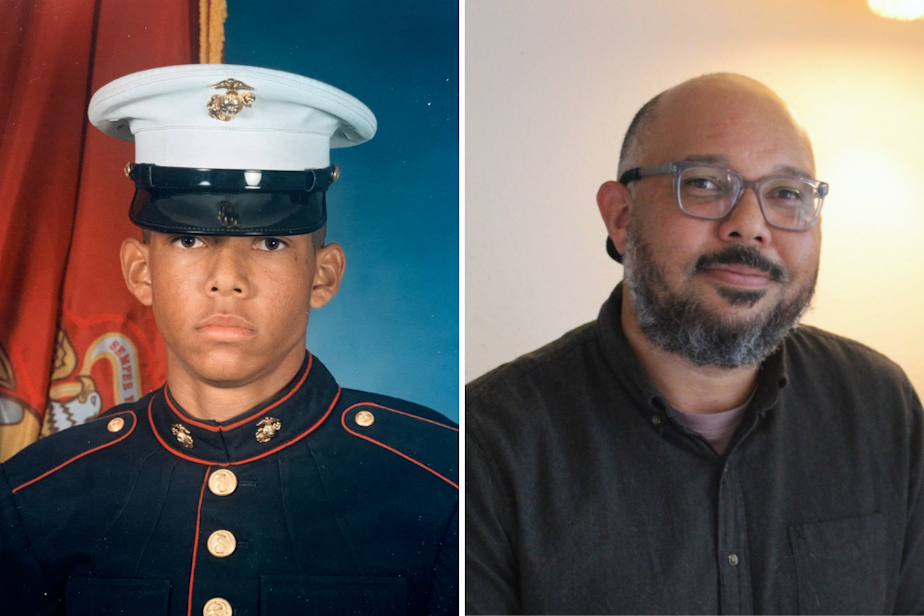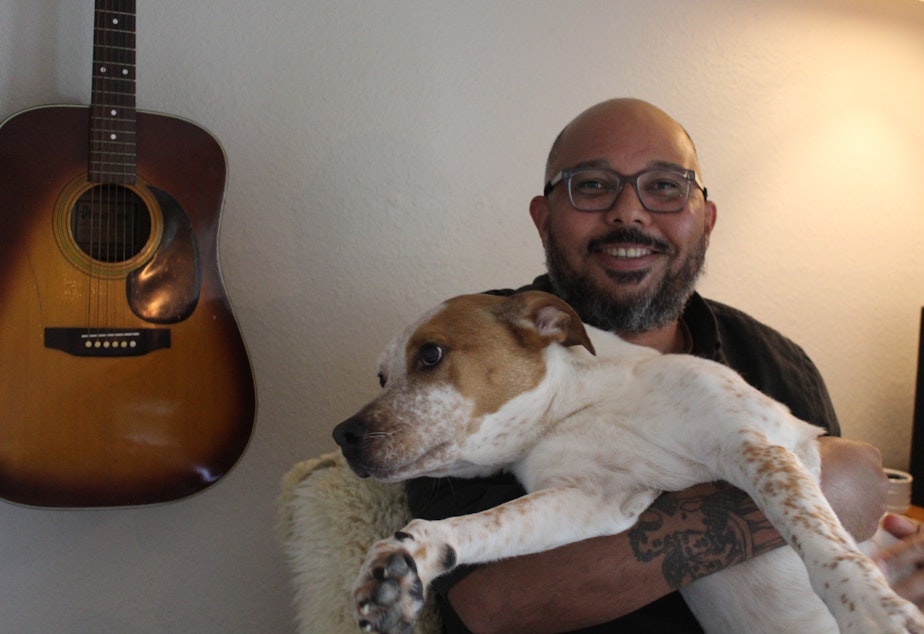Why one young Marine refused to fight in Iraq

It’s been more than 20 years since the U.S. invaded Iraq. For Darren Fisher, it’s been more than 20 years since he said, "No" to that invasion.
RadioActive’s Olivia Asmann has the story of one young Marine’s objection to fighting in the so-called war on terror.
This story discusses the realities of the military and war.
[RadioActive Youth Media is KUOW’s radio journalism and audio storytelling program for young people. This story was entirely youth-produced, from the writing to the audio editing.]
W
hen Darren Fisher was 17, he was looking for a way out.
His home in San Diego was unsafe, but he didn’t want to end up on the streets. He needed housing, food, and a steady paycheck.
He also wanted to be a part of something noble, something bigger than himself. The military could give him all that, so he walked into a recruitment office for the U.S. Marine Corps and said he wanted to join.
But Fisher was still a minor, and he hadn’t graduated high school yet. His close friends were confused by his choice. Still, he was insistent.
The Marines helped him finish high school early, and they sent a recruiter to his home to help him convince his mom to surrender his custody to the U.S. government.
"I remember my eagerness for her to sign that paper," Fisher said. "And I remember her reluctance to do so. And I remember the recruiter playing the advocate for me and my wishes to join, and being very persuasive, and calming my mother and any worries that she had about me and my safety or my future and what it meant to actually sign these papers."
Finally, his mom signed. Fisher went off to boot camp, where he learned to call a wall a 'bulkhead,' the floor the 'deck,' and a shirt a 'blouse.' He described the experience as “relearning."
"You strip away everything that that a person knows, especially a very young person — essentially a child — and it's very scary. So there's a lot of fear," he said.
After about three months, he graduated boot camp. Fisher was really proud.
Once he completed infantry training, he went on his first deployment. By this time he was 18 years old. He sailed to different ports and cross-trained with allied armies. Fisher saw the world for the first time. Soon after, he returned back to Base Camp Pendleton, just outside of San Diego.
Then, everything changed. On Sept. 11, 2001, Fisher watched the second plane hit the World Trade Center live on TV. The whole unit was called to the parade deck. The commanding officer explained what had happened. He told them they were going to war.
"The first thing I noticed was everybody's reaction to that. It was immediate. There was cheers and excitement," Fisher said. "And I just remember being really confused by that. There was this weird celebration happening. And I wasn't really understanding what there was to celebrate."
In short time, Fisher was on a transport ship in the Persian Gulf. His unit was a reserve force — any day he could be called to the frontlines of the war in Afghanistan.
A year passed, and they didn’t see any combat. Back at home, the focus shifted from a war in Afghanistan to another war, in Iraq.
"Before I knew it, we were going to Iraq," Fisher said. "I remember it being a surprise, like it was kind of from left field. There was all this 'Afghanistan, Afghanistan, al Qaeda, Osama bin Laden.' And then it was, 'We're going to Iraq, Saddam Hussein.' And that was confusing. I didn't understand where that was coming from."
They were told that, in Iraq, they would be facing combat.
The people around him were determined, even excited.
"This was the first time where I had that sense of, 'I might be in the wrong place,'" he said.
Fisher didn’t believe that Iraq had weapons of mass destruction. He knew he could not be a part of the U.S. invasion.
Once again, he needed to find a way out.
At the time, because of the risk of chemical weapons, Marines were required to get vaccinated against anthrax.
Fisher decided his way out would be to refuse the vaccine.
"I knew that taking that vaccination was to comply with the eventual invasion," he said. "I did not believe in it. I did not trust my leadership at all."
When it was Fisher’s turn to receive the vaccine, he said no. And he kept saying no, as he was sent higher and higher up the ranks. At every level, he faced pushback.
"In the military, there's pressure applied to individuals who want to be individuals, for obvious reasons," he said. "Because you can't really have an individual in a functioning, fighting military force. And that person is going to get corrected one way or another."
A member of the U.S. military who refuses to fight can face dishonorable discharge, loss of pay and benefits, and even jail time, in addition to societal stigma. Fisher was told he could do 10 or more years in the brig — military prison — for his decision.
Fisher’s ascent up the chain of command brought him all the way to the border of Iraq. A full colonel took him aside one last time to talk “man to man,” assuring Fisher he needed to be a part of this. The colonel reminded Fisher that he was part of a unit, and if he left, that unit would have to deploy — and potentially fight and die — without him.
"He was like, 'Son, you're going to miss out with your fellow Marines on this historic event. You really need to be there. Don't you want to be there with them?' And I said, 'No, no, I don't.'"
Fisher didn’t see how invading Iraq would help anyone. And he knew he didn't want to kill.
"What really caused the most psychological distress was the idea of shooting at another human being — who was a total stranger, who I've never met, who has lived a complete life," he said. "And I was gonna go over there and then shoot at them. Just that idea was incredibly disturbing, and frankly worse than any repercussions that I could have gotten from the Marines for refusing to take the vaccine or invade Iraq."
With that last failed attempt, Fisher’s superiors realized he wasn’t going to give in. He was placed in the stockade on the ship.
"I was put in isolation so that I didn't have contact with with anybody else on on the ship, specifically other Marines," he said. "I wasn't to be talked to, that was sort of the order."
Fisher was sent back to Camp Pendleton and placed in the brig. He doesn’t remember how long he spent in there. Even once he was released, Fisher had to wait to be discharged. The date kept being pushed back.
While he was waiting, he started dreaming and planning for his future.
"I was starting to form a vision of what I wanted for myself," he said. "And I wanted that to start immediately, but I couldn't until I was processed out. So it was a lot of waiting in anticipation."
When Fisher was finally discharged, it was just a few months shy of his original enlistment of four years. His discharge was other than honorable for reasons of misconduct, making him ineligible for veterans benefits.
The first thing Fisher did when he got out was throw everything away. The only photo left of him in the Marines is the one he sent to me for this story, saved by his mom.
"There was so much anger and resentment built up by that point that I didn't want to look at anything affiliated with the Marine Corps," he said. "So I got rid of everything."
Then, Fisher moved on with his life. Over time, the anger faded. Today, with 20 years of healing and hindsight, he sees his experience much differently.
"This is a classic tale of growing and learning," he said. "It's about having an experience and taking something away from it."
He said he understands structures of power now. He understands power requires compliance.
"If you don't comply, that's an act of resistance," Fisher said.
Fisher’s time in the Marines informed who he is today, as a citizen, a husband, a mental health counselor, and a friend. Despite the lack of supportive adults in his early life, he became one in mine.
Today, Darren Fisher has everything he was looking for at 17. But none of it came from the Marines.
This story was produced in a RadioActive Youth Media introductory workshop for high school-age youth. Production assistance by Frankie St. Pierre Nelson. Consultation support by Joshua Penner. Edited by Casey Martin. Prepared for the web by Kelsey Kupferer.
Find RadioActive on Instagram, TikTok, YouTube and Facebook, and on the "RadioActive" podcast.
Support for KUOW's RadioActive comes from the Bill & Melinda Gates Foundation Discovery Center and BECU.

